The Carpathians - University of British Columbia
The Carpathians - University of British Columbia
The Carpathians - University of British Columbia
Create successful ePaper yourself
Turn your PDF publications into a flip-book with our unique Google optimized e-Paper software.
phant that drowned in a ship fire <strong>of</strong>f the coast <strong>of</strong> New Brunswick in 1836;<br />
the sequence as a whole is a Noah's Ark critique, a tale <strong>of</strong> death and remembrance,<br />
cruelty and revelation. Anne Chislett's play Yankee Notions again<br />
reconstructs Susanna Moodie's relation to the war <strong>of</strong> 1837. J ane Urquhart's<br />
earnest Away and Graeme Gibson's inventive Gentleman Death both dip<br />
enterprisingly into the past to illuminate the present, the one as immigrant<br />
saga, the other as psychological metaphor; David Adams Richards' For<br />
Those Who Hunt the Wounded Down tells quietly and inexorably <strong>of</strong> the violence<br />
that swings back from the past to disrupt the present (though it also<br />
records the persistence <strong>of</strong> love); and in Christopher Columbus Answers All<br />
Charges, Mark Giacomelli and Yuri Rabinsky construct a reply to current<br />
history by assembling the ostensible diary fragments and reflections <strong>of</strong> the<br />
now-much-maligned "discoverer" <strong>of</strong> the Americas: "I have brought you a<br />
New World," Columbus muses finally, "and I forgive you all." He forgives,<br />
perhaps as much as anything else, the modern fondness for exclusive binaries<br />
and the modern eagerness to appear politically correct.<br />
"Fictions" that are cast as personal memoir <strong>of</strong>fer a variant form <strong>of</strong> this<br />
will to find meaning in the passing <strong>of</strong> time. <strong>The</strong>se are epistemological<br />
claims, literary works that use the past as a trope to shape the acceptability<br />
<strong>of</strong> knowledge. George McWhirter's lyric sequence A Staircase For All Souls:<br />
<strong>The</strong> <strong>British</strong> <strong>Columbia</strong> Suite displays a wonderful eye for images in the wet<br />
west coast woods, the whole poem crafted to suggest the cadences <strong>of</strong> creativity,<br />
in poetry and in life. Harold Rhenisch's Out <strong>of</strong> the Interior: <strong>The</strong> Lost<br />
Country crafts evocatively a set <strong>of</strong> glimpses <strong>of</strong> an immigrant Okanagan boyhood,<br />
claiming adult space as it reshapes boyhood time. Also set in <strong>British</strong><br />
<strong>Columbia</strong>, Peter Trower's Grogans Cafe recreates the life <strong>of</strong> a 19-year-old<br />
awkwardly discovering sex and independence in a logging camp (the vocabulary<br />
<strong>of</strong> the logging industry is accurate and apt). Evelyn Lau's Fresh Girls<br />
and Other Stories details a less enfranchising sexual past, in laconic tales <strong>of</strong><br />
massage parlours and hypodermic needles. Gavin Scott's Memory Trace,<br />
Hugh Hood's Be Sure to Close Your Eyes, Dennis Lee's sexually-charged Riffs,<br />
Richard Teleky's Goodnight, Sweetheart, Karen Connelly's This Brighter<br />
Prison: memory is the structuring device in all <strong>of</strong> these books, resulting in<br />
varying degrees <strong>of</strong> guilt, consternation, illumination, and freedom. Farther<br />
afield, Ven Begamudré's Van de GraafDays tells <strong>of</strong> a boy educated in India<br />
as well as in Canada. Bill Schermbrucker's Motortherapy uses the automobile<br />
as a unifying image in a linked series <strong>of</strong> stories about Kenya, Canada,

















